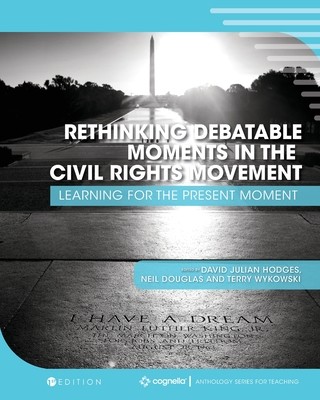
- We will send in 10–14 business days.
- Publisher: Cognella Academic Publishing
- Year: 2019
- Pages: 368
- ISBN-10: 179350735X
- ISBN-13: 9781793507358
- Format: 20.3 x 25.4 x 1.9 cm, softcover
- Language: English
- SAVE -10% with code: EXTRA
Rethinking Debatable Moments in the Civil Rights Movement (e-book) (used book) | bookbook.eu
Reviews
Description
Through a collection and analysis of carefully selected readings, Rethinking Debatable Moments in the Civil Rights Movement: Learning for the Present Moment highlights particular issues, tensions, and dynamics within the Civil Rights Movement. The text asks pointed questions regarding debatable moments of the Civil Rights Movement in order to encourage critical study, stimulate thinking about possible consequences then and now, seek answers or refine the questions, and seek direction for the present moment.
The readings are organized in chapters according to the debatable moments: 1) Should the NAACP have pursued the case of Claudette Colvin in combating bus segregation in Montgomery?; 2) Should Dr. Martin Luther King, Jr., have joined the Freedom Riders when invited to do so in 1961?; 3) Should children have been allowed to participate in the Birmingham Campaign protests in 1963?; 4) Should SNCC's John Lewis have agreed to amend his speech in the 1963 March on Washington?; and 5) Should Dr. Martin Luther King, Jr., have turned the marchers around at the Edmund Pettus Bridge in Selma after Bloody Sunday? General and chapter introductions and an epilogue explore the context, the key players, the issues, the nature of the crisis, and the consequences and implications of each debatable moment.
Rethinking Debatable Moments in the Civil Rights Movement is an excellent supplementary text for courses in anthropology, sociology, black studies, and related social science disciplines.
David Julian Hodges is a professor of anthropology at Hunter College of the City University of New York. He received his Ph.D. from New York University and has done postdoctoral study at Harvard and Oxford Universities.
Neil Douglas is a consultant, independent researcher, and principal of the Oxford Consulting Group in Houston, Texas. His work with universities, hospitals, global companies, and technology companies is focused on aligning culture, strategy, and behavior with purpose and reality.
Terry Wykowski is a consultant, independent researcher, and principal of the Oxford Consulting Group in Houston, Texas. She holds master's degrees in counseling and education from Hunter College of the City University of New York, as well as a master's in management studies from the University of Oxford.
EXTRA 10 % discount with code: EXTRA
The promotion ends in 18d.06:17:38
The discount code is valid when purchasing from 10 €. Discounts do not stack.
- Publisher: Cognella Academic Publishing
- Year: 2019
- Pages: 368
- ISBN-10: 179350735X
- ISBN-13: 9781793507358
- Format: 20.3 x 25.4 x 1.9 cm, softcover
- Language: English English
Through a collection and analysis of carefully selected readings, Rethinking Debatable Moments in the Civil Rights Movement: Learning for the Present Moment highlights particular issues, tensions, and dynamics within the Civil Rights Movement. The text asks pointed questions regarding debatable moments of the Civil Rights Movement in order to encourage critical study, stimulate thinking about possible consequences then and now, seek answers or refine the questions, and seek direction for the present moment.
The readings are organized in chapters according to the debatable moments: 1) Should the NAACP have pursued the case of Claudette Colvin in combating bus segregation in Montgomery?; 2) Should Dr. Martin Luther King, Jr., have joined the Freedom Riders when invited to do so in 1961?; 3) Should children have been allowed to participate in the Birmingham Campaign protests in 1963?; 4) Should SNCC's John Lewis have agreed to amend his speech in the 1963 March on Washington?; and 5) Should Dr. Martin Luther King, Jr., have turned the marchers around at the Edmund Pettus Bridge in Selma after Bloody Sunday? General and chapter introductions and an epilogue explore the context, the key players, the issues, the nature of the crisis, and the consequences and implications of each debatable moment.
Rethinking Debatable Moments in the Civil Rights Movement is an excellent supplementary text for courses in anthropology, sociology, black studies, and related social science disciplines.
David Julian Hodges is a professor of anthropology at Hunter College of the City University of New York. He received his Ph.D. from New York University and has done postdoctoral study at Harvard and Oxford Universities.
Neil Douglas is a consultant, independent researcher, and principal of the Oxford Consulting Group in Houston, Texas. His work with universities, hospitals, global companies, and technology companies is focused on aligning culture, strategy, and behavior with purpose and reality.
Terry Wykowski is a consultant, independent researcher, and principal of the Oxford Consulting Group in Houston, Texas. She holds master's degrees in counseling and education from Hunter College of the City University of New York, as well as a master's in management studies from the University of Oxford.


Reviews